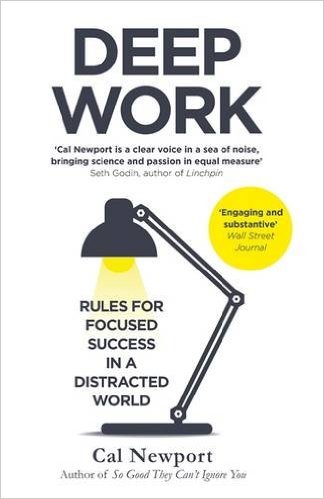
'Deep Work' and the PhD
During my recent short break from the PhD, I decided to read a couple of non-PhD books to keep me amused and help me switch off from eighteenth-century children for a while. Because my research has such a strong literature focus, I often find it hard to read fiction and relax while doing so. I find myself over-analysing texts as I read and often find something interesting that I want to note down before I forget, which makes reading feel a lot like work!
I tend to combat this by either reading contemporary children's books, of which there are some truly excellent ones out there, or by reading non-fiction. For my week off, I chose non-fiction.
My fiance, David, is a web-developer and we often talk about how similar coding can be to the PhD-writing process. I've written before about imposter syndrome and one of the best articles I've read about that was written by a developer. So, while I was in the middle of stressing out about my PhD, Dave sent me a link to a podcast which he thought I would enjoy: 'How to be Original and Make Big Ideas Happen' from a16z. I'm not normally a big podcast listener (I've always found it much easier to take things in by reading than by listening) but this particular programme was really interesting and it led me to choose the books I wanted to spend my time off with. The programme discussed Adam Grant's new book Originals: How Non-Conformists Move the World. It's an excellent book which I'm still working my way through (and which is, sadly, slightly worse for wear having been at the bottom of a rucksack during a rather wet long-distance walk over the Easter weekend!) but as is the danger with Amazon, it pointed me in the direction of lots of other similar books for me to spend my hard-earned money on, including the one that has really affected how I now see my PhD work: Cal Newport's Deep Work: Rules for Focused Success in a Distracted World.
I mentioned this book briefly when I talked about whether social media can be detrimental to the PhD but wanted to devote a whole post to it.
The premise behind Cal Newport's book is that in our current knowledge economy, 'deep work', which he defines as "cognitively demanding activities that leverage our training to generate rare and valuable results, and that push our abilities to continually improve" is increasingly rare but also increasingly valuable. He argues that knowledge workers spend too much time indulging in shallow activities which give a sense of productivity and success but which are ultimately "empty" (email, social media etc.). Although the context for Newport's premise is focused on business, he is also an academic and there is therefore a lot that PhD students can take away from what he says.
One of the sections of the book which really struck a chord with me was when Newport was discussing his academic productivity. He had already published an impressive number of articles but he set the goal to write nine journal articles that academic year. Using the principles of focused work, he ended up publishing thirteen articles, while managing to take evenings and weekends off.
The idea that to do your best work, you only need to devote 15-20 hours of focused work a week, while coming to terms with the fact that that period of intensive productivity will be difficult and uncomfortable really appealed to me. It fits in with how I see my ideal life - filled with hard work that I'm passionate about and that challenges me with plenty of time left to devote to my family and friends, my health and personal growth and all the other fun things that make life worth living!
Discussions around productivity and working hours often comes up in conversation among my fellow PhD students and I have always been an advocate of a good work/life balance. (In fact, a lot of discussion came out of my last blog post on taking holidays, including this really interesting post by a PhD candidate at the University of Aberdeen.)
That doesn't mean I don't sometimes work in the evenings or over the weekend but I always try to keep it in check and, if I do end up having to put in those extra long hours, I make sure to ask myself why. Is there something I could have done differently so I don't have to give up that valuable time with my fiance, friends and family?
Having read Newport's book I am even more convinced that to be successful and productive during the PhD, and afterwards when building an academic career, you don't need to sacrifice the rest of your life, or work yourself into a state of stress and ill health. After all, who can argue with publishing 50 peer-reviewed articles and five books by the middle of your career?